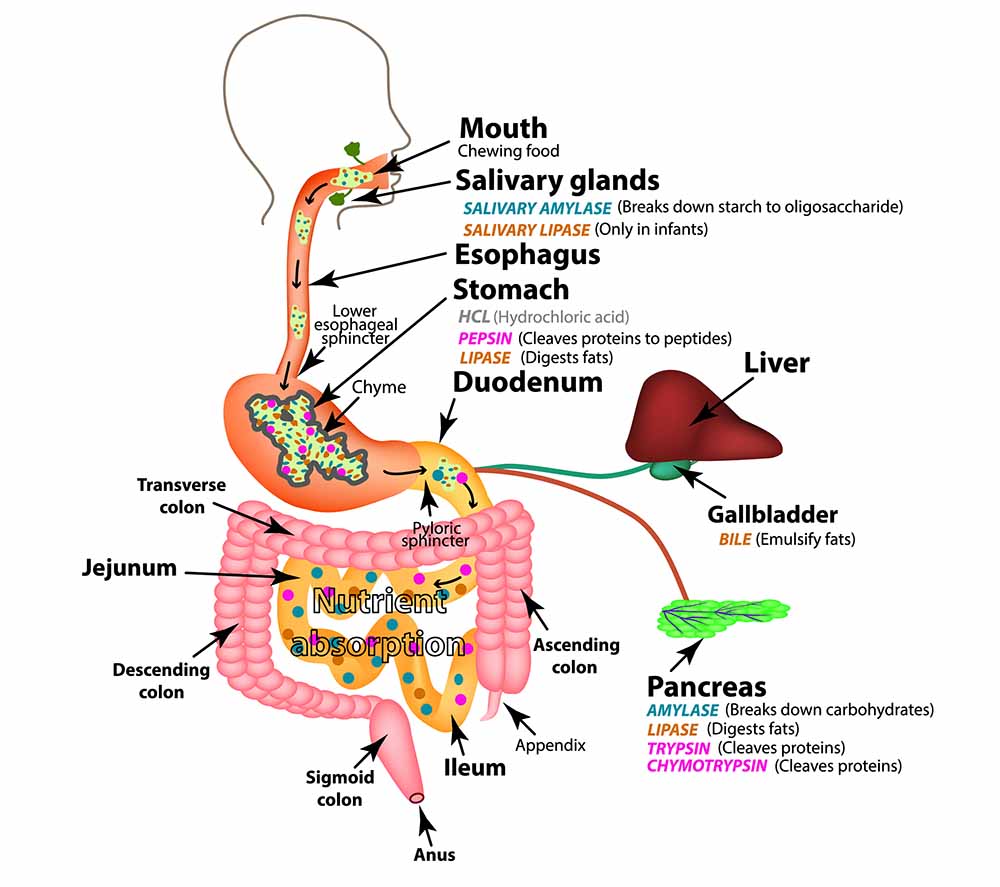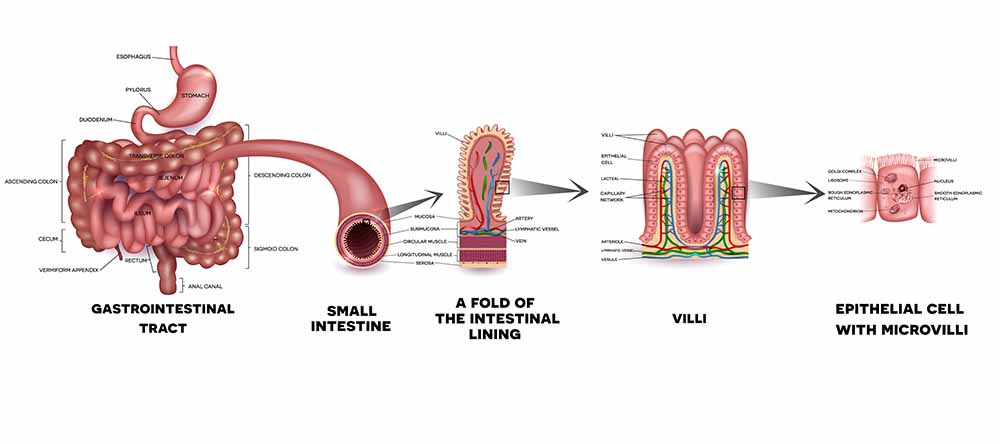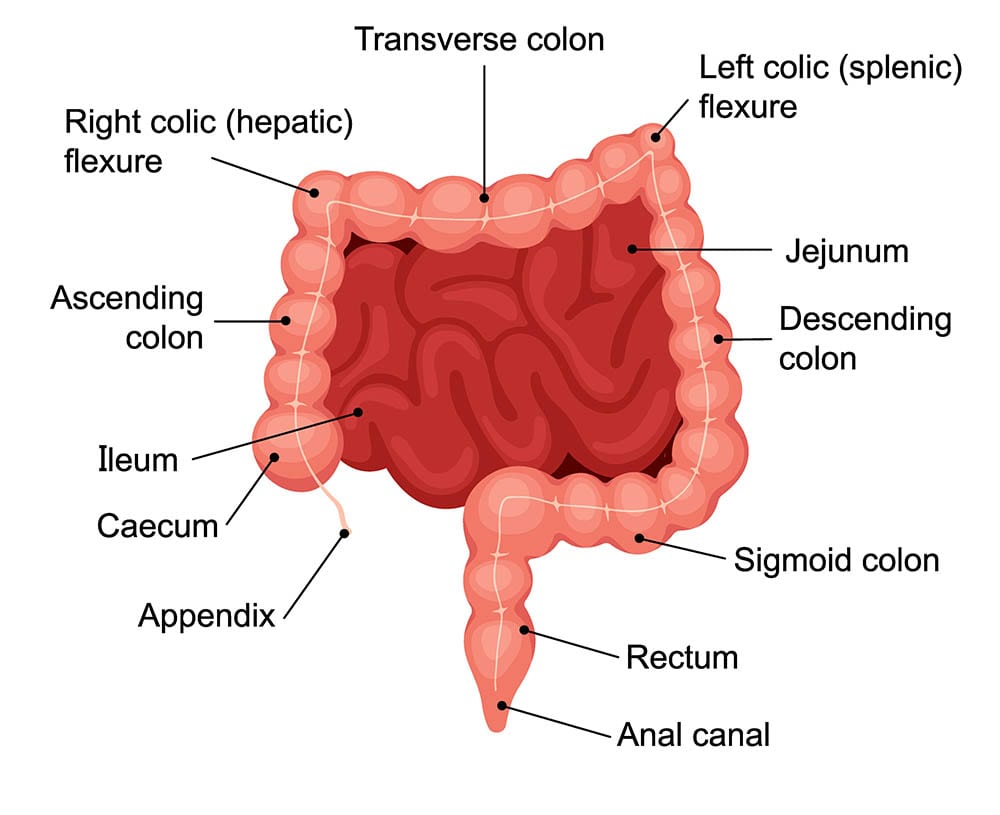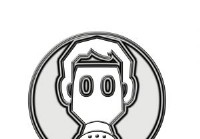SIBO, of Small Intestinal Bacterial Overgrowth, is een aandoening waarbij gewone bacteriën die normaal in ons leven, in grotere aantallen in de dunne darm terechtkomen dan normaal, wat een ravage veroorzaakt. Tot 20% van de Amerikanen en 1 op de 5 Australiërs heeft het prikkelbaredarmsyndroom. Onderzoek toont aan dat gemiddeld 60% van alle mensen met IBS daadwerkelijk SIBO heeft, dus deze aandoening komt vaak voor, maar is niet altijd goed bekend.
Voordat we ingaan op de oorzaak van SIBO, en ook hoe en waarom we het ontwikkelen, laten we eerst kijken naar hoe het spijsverteringsstelsel werkt, omdat dit helpt om uit te leggen wat er mis gaat als we SIBO ontwikkelen.

Het menselijke spijsverteringsstelsel is één lange, doorlopende buis, verdeeld in secties, die begint bij de mond en eindigt bij de anus. Het ondersteunt het complexe proces van het verteren van voedsel door het om te zetten in voedingsstoffen die het lichaam gebruikt voor energie en uiteindelijk om te overleven. Het oude gezegde 'je bent wat je eet' is gedeeltelijk waar, want we zijn niet alleen wat we eten, maar ook wat we opnemen.
De spijsvertering vindt plaats voordat we zelfs maar onze eerste hap eten. Wanneer we beginnen na te denken over eten, beginnen met koken of kijken hoe ons voedsel wordt bereid, sturen de hersenen signalen naar het spijsverteringskanaal om ons klaar te maken voor voedsel. Onze speekselklieren gaan speeksel produceren, wat ons helpt ons voedsel af te breken. Bij de eerste hap voedsel neemt onze speekselproductie toe en helpen onze tanden en tong ons om op ons voedsel te kauwen, wat de eerste stap is in het afbreken van ons voedsel voor de spijsvertering. Speeksel bevat enzymen die ons voedsel helpen afbreken. Daarom is het zo belangrijk om ons voedsel grondig te kauwen om een betere spijsvertering te bevorderen.
Zodra we slikken, passeert ons voedsel onze slokdarm door een reeks spiersamentrekkingen, peristaltiek, voordat het bij de maag aankomt. De onderste slokdarmsfincter gaat open om voedsel in de maag te laten komen en sluit vervolgens weer om het daar te houden. Wanneer deze sluitspier niet correct werkt, kunnen mensen GERD of brandend maagzuur ervaren, doordat voedsel terugkomt in de slokdarm.
De maag fungeert niet alleen als een zakje voor voedsel, maar geeft ook meer spijsverteringsenzymen en zuren vrij om de vertering van voedsel verder te verbeteren, door het te veranderen in een dikke zure pasta die chymus wordt genoemd.
Terwijl de chymus klaar is om te worden verwerkt, duwen peristaltische golven het naar de pylorische sluitspier, de poort tussen maag en dunne darm. Het gaat kort open, zodat er een kleine hoeveelheid doorheen kan en het proces van absorptie in de dunne darm begint. Al het voedsel gaat niet in één keer door, omdat dit het systeem zou overspoelen en geen beheersbaar volume zou zijn om de absorptie van te maximaliseren.
De pylorische sluitspier fungeert als een eenrichtingspoort en voorkomt dat de chymus vanuit de dunne darm terug in de maag terugvloeit.
De maag is een belangrijk verdedigingssysteem tegen de bacteriën en pathogene organismen die we binnenkrijgen, en de meeste worden op dit punt vernietigd. Als je niet voldoende enzymen of zuren hebt, kunnen bacteriën overleven en naar de dunne darm gaan.
De dunne darm is het werkpaard van het spijsverteringsstelsel, omdat hier de meeste van onze voedingsstoffen worden opgenomen. Het is ongeveer 6 meter lang (20 voet) en is verdeeld in drie secties:de twaalfvingerige darm, jejunum en ileum. De twaalfvingerige darm is voornamelijk verantwoordelijk voor de verdere afbraak van de chymus, ondersteund door enzymen uit de pancreas en gal uit de lever, terwijl het jejunum en ileum voornamelijk verantwoordelijk zijn voor de opname van voedingsstoffen in de bloedbaan via de villi en microvilli.

Deze vingerachtige structuren in de dunne darm helpen ons onze voedingsstoffen op te nemen. Elke villus (enkelvoud villi) heeft microvilli die het bedekken, waardoor het oppervlak van de dunne darm wordt vergroot. Elke overgebleven chymus gaat dan door naar de dikke darm.
Omdat het de rol van de dunne darm is om voedingsstoffen uit voedsel op te nemen, heeft het hiervoor geen hulp van bacteriën nodig en moet het een relatief steriele omgeving zijn. Als we grote aantallen bacteriën in de dunne darm hebben, concurreren ze met ons om ons voedsel en verstoren ze de spijsvertering en opname. Dit is de reden waarom mensen met SIBO ongemakkelijke symptomen kunnen ervaren en tekortkomingen kunnen ervaren - hun dunne darm is hier niet uitgerust om met bacteriën om te gaan.
Het proces van het verplaatsen van materie naar de dikke darm wordt motiliteit genoemd. Het migrerende motorcomplex (MMC), of sweeper wave, duwt overgebleven afval en andere materie zoals bacteriën langs de dunne darm en ruimt deze op zodat deze niet stilstaat. Dit proces is sterk afhankelijk van een netwerk van zenuwen, spieren en hormonen, en vindt plaats in nuchtere toestand (dwz niet wanneer u eet) elke 90 minuten en 's nachts en wordt vaak verstoord bij SIBO-patiënten. Daarom wordt intermitterend vasten, geen tussendoortjes en 4-5 uur tussen de maaltijden aanbevolen voor SIBO-patiënten.
De klep tussen de dunne darm en de dikke darm wordt de ileocecale klep genoemd en werkt als een eenrichtingssysteem dat voorkomt dat materie in de dikke darm opnieuw in de dunne darm terechtkomt.
Het duurt 3-5 uur voordat de chymus volledig uit de maag en dunne darm is geleegd en in de dikke darm is terechtgekomen.
De dikke darm is ongeveer 1,5 meter lang (5 voet) en sluit aan op de dunne darm en het rectum, en is verdeeld in de blindedarm, de opgaande colon, de transversale colon, de dalende colon en de sigmoid colon.
Het herbergt biljoenen bacteriën. De primaire functie van de dikke darm om de opname van voedingsstoffen en water te voltooien, bepaalde vitamines te synthetiseren, ontlasting te vormen en deze uit het lichaam te verwijderen.
De bacteriën die in de darmen leven, worden het darmmicrobioom genoemd en het microbioom van elke persoon is uniek voor hen.

Chyme komt de blindedarm binnen vanuit de dunne darm en beweegt zich langzaam een weg door de dikke darm door een proces van peristaltiek, waarbij water wordt geabsorbeerd, zodat het verandert van een vloeibare toestand naar een vaste toestand. Als de stof te snel beweegt, wordt er niet genoeg water opgenomen en kan dit leiden tot uitdroging en diarree. Als de materie te langzaam beweegt, kan er te veel vloeistof worden opgenomen, waardoor de ontlasting te vast wordt en constipatie ontstaat.
Feces bestaat meestal uit onverteerde voedseldeeltjes, bacteriën, oude epitheelcellen van het maagdarmslijmvlies, anorganische zouten en water. Wanneer het het rectum bereikt, stuurt het een signaal naar de hersenen om het te laten weten dat het geleegd moet worden. We kennen deze sensatie vaak als een behoefte om te poepen. We kunnen vrijwillig de drang om te poepen onder controle houden door vast te houden totdat we een toilet kunnen bereiken. De ontlasting wordt dan door de anus en uit het lichaam geleid.
Krijg direct toegang tot 5 weken onschatbare SIBO-content en deskundige inzichten, allemaal op één plek.
Deze on-demand cursus is het begin van je reis terug naar gezondheid. En het mooie is:je kunt het in je eigen tijd, in je eigen tempo en zo vaak gebruiken als je wilt!
LEER HOE JE EINDELIJK GOED KUNT LEVEN MET SIBO
Nu je begrijpt hoe het spijsverteringsstelsel zou moeten werken, gaan we eens kijken wat er gebeurt als het niet goed functioneert en bacteriën in de dunne darm kan overgroeien.
Volgens toonaangevende SIBO-expert, Dr Allison Siebecker , zijn er slechts drie hoofdoorzaken van SIBO:

Een gebrekkig migrerend motorcomplex

































Structurele veranderingen in de dunne darm

































Frank Immunodeficiëntiestoornis
Het Migrating Motor Complex is de nummer één bescherming tegen de ontwikkeling van SIBO, omdat het bacteriën, chymus en celresten uit de dunne darm verwijdert en naar de dikke darm verplaatst.
De meest voorkomende oorzaak van een tekort aan MMC is te wijten aan voedselvergiftiging. In simplistische termen, wanneer een voedselvergiftigingsepisode optreedt, raken de zenuwcellen beschadigd, waardoor de MMC wordt belemmerd of gestopt.
Ondersteuning van de MMC is een belangrijk, maar vaak vergeten onderdeel van de SIBO-behandeling. This can be done through the use of herbal and/or pharmaceutical prokinetics and intermittent fasting (where appropriate and if the patient is not underweight).
If the structure of the small intestine is compromised, through adhesions, strictures, tumours, compression, blind loops, small intestine diverticula, twists or kinks, the body's ability to completely clear the small intestine is compromised, thus increasing the likelihood of SIBO developing.
The treatment of any structural alterations of the small intestine is an important step in the long term recovery and successful clearing of SIBO. If this is not addressed, relapse is common.
When the immune system does not work correctly, it cannot kill or efficiently move out bacteria from the small intestine, thus allowing it to overgrow. Where Frank Immunodeficiency Disorder is present, it is often common for a SIBO patient to also have a deficient MMC and issues with their hydrochloric acid (HCl).
In addition to the above agreed upon what causes SIBO, there are some other conditions that may cause SIBO, although there is not a consensus that they are responsible for it. However, they are seen as risk factors which can contribute to the development of a cause.

































Deficient hydrochloric acid

































Removed, damaged or inefficient ileocecal valve

































Bile and enzyme issues
While there are only three agreed upon what causes SIBO, there are a multitude of risk factors that can lead to one of the causes of SIBO. Deze omvatten:

































Digestive infections. bijv. Gastroenteritis, food poisoning

































Diseases eg. Diabetes, Hypothyroid, Parkinsons Disease, Scleroderma, Ehlers Danlos

































Pharmaceutical use. bijv. antibiotics, opiates

































Lifestyle factors. bijv. Stress, poor sleep, poor eating habits

































Diseases eg. Endometriosis, Inflammatory Bowel Diseases, Cancer, Appendicitis

































Surgery and/or Injury. bijv. C-section, laparoscopy, Adhesions

































Diseases eg. HIV, CCL, T cell deficiency

































Proton Pump Inhibitors (PPIs)

































Hypochlorhydria

































Ileocecal valve issues. bijv. Surgical removal or partial obstruction
"Without addressing the underlying cause(s), it can be difficult to fully resolve your SIBO, and this is why relapse is so common.
Rebecca Coomes
I regularly speak with SIBO patients who have never discussed why they developed SIBO with their practitioner. If this is you, I recommend you share this article with them and ask to review your possible causes and risk factors at your next appointment.
If you are like me and have damaged nerves which impair your body's ability to efficiently operated the MMC, you may need to take a prokinetic long-term to support the clearing of the small intestine.
If you find that you relapse regularly or quickly from each round of SIBO treatment, this suggests the underlying reason(s) of why you have SIBO is not being addressed, and as soon as treatment finishes, the bacteria can accumulate in your small intestine, leading to your relapse.
Now that you understand how the digestive system should work, let's look at what happens when it is not functioning properly and allows bacteria to overgrow in the small intestine.
According to leading SIBO expert, Dr Allison Siebecker , there are only three main causes of SIBO:

































A deficient Migrating Motor Complex

































Structural alterations to the small intestine

































Frank Immunodeficiency Disorder
The Migrating Motor Complex is the number one protection against the development of SIBO as it clears out bacteria, chyme and cellular debris from the small intestine and moves it into the large intestine.
The most common cause of a deficient MMC is due to food poisoning. In simplistic terms, when a food poisoning episode occurs, the nerve cells get damaged, thus impairing or stopping the MMC from working.
Supporting the MMC is an important, yet often forgotten component in SIBO treatment. This can be done through the use of herbal and/or pharmaceutical prokinetics and intermittent fasting (where appropriate and if the patient is not underweight).
If the structure of the small intestine is compromised, through adhesions, strictures, tumours, compression, blind loops, small intestine diverticula, twists or kinks, the body's ability to completely clear the small intestine is compromised, thus increasing the likelihood of SIBO developing.
The treatment of any structural alterations of the small intestine is an important step in the long term recovery and successful clearing of SIBO. If this is not addressed, relapse is common.
When the immune system does not work correctly, it cannot kill or efficiently move out bacteria from the small intestine, thus allowing it to overgrow. Where Frank Immunodeficiency Disorder is present, it is often common for a SIBO patient to also have a deficient MMC and issues with their hydrochloric acid (HCl).
In addition to the above agreed upon what causes SIBO, there are some other conditions that may cause SIBO, although there is not a consensus that they are responsible for it. However, they are seen as risk factors which can contribute to the development of a cause.

































Deficient hydrochloric acid

































Removed, damaged or inefficient ileocecal valve

































Bile and enzyme issues
While there are only three agreed upon what causes SIBO, there are a multitude of risk factors that can lead to one of the causes of SIBO. Deze omvatten:

































Digestive infections. bijv. Gastroenteritis, food poisoning

































Diseases eg. Diabetes, Hypothyroid, Parkinsons Disease, Scleroderma, Ehlers Danlos

































Pharmaceutical use. bijv. antibiotics, opiates

































Lifestyle factors. bijv. Stress, poor sleep, poor eating habits

































Diseases eg. Endometriosis, Inflammatory Bowel Diseases, Cancer, Appendicitis

































Surgery and/or Injury. bijv. C-section, laparoscopy, Adhesions

































Diseases eg. HIV, CCL, T cell deficiency

































Proton Pump Inhibitors (PPIs)

































Hypochlorhydria

































Ileocecal valve issues. bijv. Surgical removal or partial obstruction
"Without addressing the underlying cause(s), it can be difficult to fully resolve your SIBO, and this is why relapse is so common.
Rebecca Coomes
I regularly speak with SIBO patients who have never discussed why they developed SIBO with their practitioner. If this is you, I recommend you share this article with them and ask to review your possible causes and risk factors at your next appointment.
If you are like me and have damaged nerves which impair your body's ability to efficiently operated the MMC, you may need to take a prokinetic long-term to support the clearing of the small intestine.
If you find that you relapse regularly or quickly from each round of SIBO treatment, this suggests the underlying reason(s) of why you have SIBO is not being addressed, and as soon as treatment finishes, the bacteria can accumulate in your small intestine, leading to your relapse.
Pin18154 Shares Wat zijn de eerste tekenen van het prikkelbaredarmsyndroom (PDS)?
Wat zijn de oorzaken van het prikkelbare darm syndroom (PDS)? De eerste tekenen en symptomen van PDS zijn buikpijn en veranderingen in de stoelgang. Buikpijn kan verergeren na de maaltijd. Zowel di
Wat zijn de eerste tekenen van het prikkelbaredarmsyndroom (PDS)?
Wat zijn de oorzaken van het prikkelbare darm syndroom (PDS)? De eerste tekenen en symptomen van PDS zijn buikpijn en veranderingen in de stoelgang. Buikpijn kan verergeren na de maaltijd. Zowel di
 Waarom fructosemalabsorptie gas, krampen en diarree veroorzaakt en hoe je het kunt verslaan
Fructose Malabsorptie kan gas, krampen en diarree veroorzaken. Als u een van deze symptomen heeft, dan is dit waarschijnlijk het belangrijkste artikel dat u ooit zult lezen. Toen ik voor het eerst hoo
Waarom fructosemalabsorptie gas, krampen en diarree veroorzaakt en hoe je het kunt verslaan
Fructose Malabsorptie kan gas, krampen en diarree veroorzaken. Als u een van deze symptomen heeft, dan is dit waarschijnlijk het belangrijkste artikel dat u ooit zult lezen. Toen ik voor het eerst hoo
 Gastro-enteroloog in Port St. Lucie, Florida
Als u op zoek bent naar de beste gastro-enterologen in Port St. Lucie, dan zal onze gids u voorzien van de informatie die u nodig heeft om de beste gastro-enteroloog in de omgeving te kiezen! In onze
Gastro-enteroloog in Port St. Lucie, Florida
Als u op zoek bent naar de beste gastro-enterologen in Port St. Lucie, dan zal onze gids u voorzien van de informatie die u nodig heeft om de beste gastro-enteroloog in de omgeving te kiezen! In onze